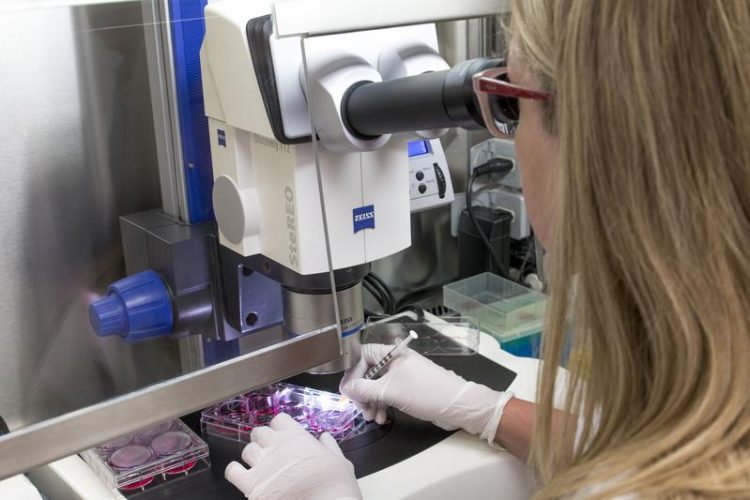New procedure to obtain induced pluripotent stem cells

Research on iPS-cells at the EURAC laboratory EURAC/Bortolotti
For their ability to differentiate into other cell types, the embryonic stem cells hold a large potential in the medical industry. Their use, however, poses ethical questions due to the fact that in order to obtain them, it is necessary to destroy the embryo. For this reason, medical researches use the so-called induced pluripotent stem cells (iPSC).
In fact, it is possible to reprogram adult cells that can be obtained by simply drawing blood and making them “regress” to a similar state to that of embryonic stem cells. The reprogrammed cells (iPSC) are capable of creating all the cell types of an adult organism, such as brain or heart cells.
The iPSC technology is revolutionizing medical science, allowing for the exploration of molecular mechanisms that regulate diseases, providing new therapeutic targets, and providing opportunities for the discovery of new drugs.
Thanks to the iPSC, the possibility to develop a truly personalized medicine will become more realistic, enabling the testing of specific drugs on cells, such as neurons and cardiomyocytes, otherwise impossible to isolate from patients with specific diseases.
“The procedure that we have developed simplifies the process that enables these cells to be obtained. With the traditional method, the blood is centrifuged with different reagents, capable of separating the blood cells according to their size. Our protocol, on the other hand, does not require the use of reagents.
This allows for the reduction of costs, time, and the complexity of procedures to be performed in the laboratory”, explain Viviana Meraviglia and Alessandra Zanon, researchers at EURAC Center for Biomedicine and main authors of the study.
“The big advantage of our method is that it can also be applied to blood samples previously collected and preserved in a biobank. We will be able to access samples collected in other studies that we have performed or from biobanks in other research centers”, continues Alessandra Rossini, study coordinator.
The research performed by the EURAC Center for Biomedicine focuses especially on cardiovascular and neurological diseases, such as Parkinson´s.
Currently, researchers are engaged in the differentiation of the cardiomyocyte induced pluripotent cells to study a genetic disease associated with a right ventricular arrhythmia (arrhythmogenic right ventricular dysplasia, ARVD) and in dopaminergic neurons, meaning specific brain cells, to study the development of Parkinson´s.
The study was published in the international scientific journal ”JoVE”, Journal of Visualized Experiments (http://www.jove.com/video/52885), who invited a troupe into the Center for Biomedicine laboratories to film all the steps of the new methodology in detail, so they could be replicated in other research centers.
Media Contact
More Information:
http://www.eurac.eduAll latest news from the category: Life Sciences and Chemistry
Articles and reports from the Life Sciences and chemistry area deal with applied and basic research into modern biology, chemistry and human medicine.
Valuable information can be found on a range of life sciences fields including bacteriology, biochemistry, bionics, bioinformatics, biophysics, biotechnology, genetics, geobotany, human biology, marine biology, microbiology, molecular biology, cellular biology, zoology, bioinorganic chemistry, microchemistry and environmental chemistry.
Newest articles

First-of-its-kind study uses remote sensing to monitor plastic debris in rivers and lakes
Remote sensing creates a cost-effective solution to monitoring plastic pollution. A first-of-its-kind study from researchers at the University of Minnesota Twin Cities shows how remote sensing can help monitor and…

Laser-based artificial neuron mimics nerve cell functions at lightning speed
With a processing speed a billion times faster than nature, chip-based laser neuron could help advance AI tasks such as pattern recognition and sequence prediction. Researchers have developed a laser-based…

Optimising the processing of plastic waste
Just one look in the yellow bin reveals a colourful jumble of different types of plastic. However, the purer and more uniform plastic waste is, the easier it is to…



